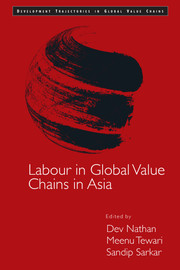Book contents
- Frontmatter
- Contents
- Figures
- Tables
- Foreword
- Preface
- Acknowledgements
- Introduction
- Captive Governance
- 2 Achieving Better Work for Apparel Workers in Asia
- 3 Improving Wages and Working Conditions in the Bangladesh Garment Sector: The Role of Horizontal and Vertical Relations
- 4 Bargaining in Garment GVCs: The Asia Floor Wage
- 5 Fresh Produce Markets, Standards, and Dynamics of Labour: Grapes in India
- 6 The ‘Zero-Fee’ Tour: Price Competition and Chain Downgrading in Chinese Tourism
- 7 Restricting Competition to Reduce Poverty: Impact of the Tourism Value Chain in an Upland Economy in China
- 8 Restructuring of Post-crisis GVCs: Tourism in Bali, Indonesia
- 9 Dynamics of Labour-intensive Clusters in China: Wage Costs and Moving Inland
- 10 Migrant Labour in Global Value Chains in Asia
- Modular Governance
- Relational Governance
- Conclusions
- Notes on Contributors
- Index
5 - Fresh Produce Markets, Standards, and Dynamics of Labour: Grapes in India
from Captive Governance
Published online by Cambridge University Press: 23 July 2017
- Frontmatter
- Contents
- Figures
- Tables
- Foreword
- Preface
- Acknowledgements
- Introduction
- Captive Governance
- 2 Achieving Better Work for Apparel Workers in Asia
- 3 Improving Wages and Working Conditions in the Bangladesh Garment Sector: The Role of Horizontal and Vertical Relations
- 4 Bargaining in Garment GVCs: The Asia Floor Wage
- 5 Fresh Produce Markets, Standards, and Dynamics of Labour: Grapes in India
- 6 The ‘Zero-Fee’ Tour: Price Competition and Chain Downgrading in Chinese Tourism
- 7 Restricting Competition to Reduce Poverty: Impact of the Tourism Value Chain in an Upland Economy in China
- 8 Restructuring of Post-crisis GVCs: Tourism in Bali, Indonesia
- 9 Dynamics of Labour-intensive Clusters in China: Wage Costs and Moving Inland
- 10 Migrant Labour in Global Value Chains in Asia
- Modular Governance
- Relational Governance
- Conclusions
- Notes on Contributors
- Index
Summary
Introduction
Fresh fruits and vegetables (FFVs) are part of the fresh produce consumption story that began in the 1970s in the Western world as opposed to canned or frozen fruits and vegetables. They are also available year-round in the consuming markets due to global sourcing. Further, they are a ‘luxury crop’, meaning they are destined for upmarket consumers who place an emphasis on quality, not bulk (Collins, 2000). Fresh produce markets are changing rapidly due to the new quality standards that range from global trade-related compliances like the Sanitary and Phyto-Sanitary Measures (SPSMs) of the World Trade Organization (WTO) to collective standards like Global Good Agricultural Practices (GlobalGAP), to private standards of individual buyers like Tesco's Nature's Choice and the codes of conduct (CoC) of various types including Ethical Trading Initiative (ETI). New markets have different product standards. For instance, both the domestic Indian and the Middle Eastern markets do not have the GlobalGAP standard requirements that the European Union (EU) markets have. This is leading to the production of new crops and the introduction of new farming practices in the developing world. New crops interface with existing xland and labour relations, which influence and are in turn influenced by such interventions. New sourcing practices lead to a new just-in-space production configuration (Fold, 2008). As the exports of Indian grape production rose, and as exports of Indian grapes shifted from the commoditized markets of the Middle East to the quality product markets of the EU, the role of GlobalGAP standards in Indian grape production has also increased.
In this context, we examine how organizational and institutional changes impact labour in the context of the Global Production Network (GPN) of a developing economy export crop and how local labour regimes influence labour governance and upgrading. We also look at the nature of labour linkage in GPNs, in terms of labour conditions at work both in pack houses and farms, as well as the gender dimensions of labour use. The shift from a commoditized to a quality product market is what is termed economic upgrading (Barrientos et al., 2011). The key question in this paper, then, is: was this economic upgrading accompanied by social upgrading5, meaning an improvement in the conditions of workers in the GlobalGAP-organized GPN as compared to those in the commoditized production of grapes?
- Type
- Chapter
- Information
- Labour in Global Value Chains in Asia , pp. 94 - 118Publisher: Cambridge University PressPrint publication year: 2016
- 3
- Cited by

